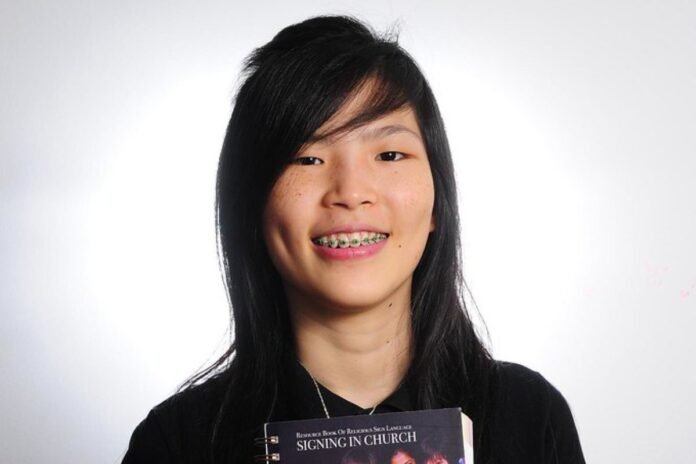Born hearing-impaired, she made sure she did not lose out at school by working doubly hard at home. Today, she hears with a hearing implant directly connected to her brain.
She’s not your typical student. She doesn’t have iPod earphones glued to her ears and watches movies without subtitles or ringtones on her cell phone.
For Ginny Ong, 21, it’s all silence.
Even though the third-year Information Technology student was born deaf, she is determined not to let her disability become a liability.
She finds inspiration in Mr Adrian Yap, the co-winner of The Amazing Race Asia, who is also deaf. “Adrian fought all the way to the top in the Amazing Race despite his deafness. If he can do it, so can I,” says Ginny.
As if to affirm this, the third-year Information Technology student recently won the Outstanding Deaf Student award for the International Day of the Deaf on Sep. 20 last year.
She had also recently helped publish a book on sign language for the Deaf, titled Resource Book of Religious Sign Language.
In the largely picture-based book published by Wesley Methodist Church in September, Ginny was the model for all the different sign gestures demonstrated.
She is determined to succeed no matter what life throws at her. But school remains an uphill struggle for people like her.
The people who helped
Besides facing obvious disadvantages in class, people who are deaf or hard of hearing must rely on others.
“Even with helpful friends, a deaf person will always be one step behind others,” says Tony Seet, 19, a third-year Business Accountancy student and a member of the Hearing-Impaired Club.
“They’ve got to rely on second-hand info. It’s even worse if no one’s willing to help them.”
Ginny admits it is tough to cope academically, “I can’t catch up with the others in class. So I’ve got to do twice the amount of preparation at home.”
A first-year Nursing student, Jeanne Koh, 17, says, “People are sympathetic, but they don’t know how to help.”
Ginny feels that the polytechnic can do a few things to help. “I wish the school could provide interpreters for the deaf in lectures so that we can understand better. Even better, note-takers like in universities,” says Ginny.
How she started
Ginny, the eldest of four siblings, learned to lipread when interacting with fellow Canossian School for the Hearing (CSH) students.
Undeterred by her disability, she moved to the mainstream course at St. Anthony’s Canossian Primary School when she was eight.
She found the transition challenging, as 40 students were in the mainstream class compared to the 8 students in CSH.
She was reluctant to mix, but interacting with hearing students gave her confidence.
“I faced lots of hurdles. But I pulled through, thanks to my parents and friends who’ve been encouraging me since young,” she says.
Cyborg girl
Technology helped.
She has a greater sense of sound after an electronic device was implanted into her brain,
“I feel like a cyborg,” she said, referring to her $40,000 cochlear hearing implants, which directly stimulate her auditory nerves.
While it does not cure deafness, it helps her hear things she never thought possible.
“I never realised,” she says, “how much I loved to hear birds chirping.”
Though this reporter felt awkward talking to her about her disability, her disarming smile and affable presence immediately dissipated the tension.
She remains unyieldingly ambitious. “I hope I will achieve big goals and do what others can do. Deaf people shouldn’t be afraid of their disability.”

